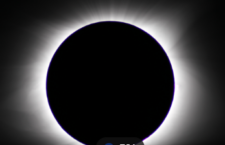In about two months, Kansans will be able to see this year’s solar eclipse making its way across North America .
The last solar eclipse, a partial eclipse, occurred in October and was an annular eclipse , meaning the moon passes between the sun and the Earth when it is farthest from the Earth. Because the moon is so far, the moon cannot cover the sun completely, which causes a ring effect around the moon, often referred to as the “ring of fire.”
April’s event is a rare total solar eclipse, which means the sun will be completely blocked out for those in the path of totality. The eclipse will pass over Mexico, Canada and the U.S. Monday, April 8. Mexico will be the first place to see the complete eclipse, peaking at 11:07 a.m.
The total eclipse will be viewable in the U.S. in Texas, Oklahoma, Arkansas, Missouri, Illinois, Kentucky, Indiana, Ohio, Pennsylvania , New York, Vermont, New Hampshire and Maine. Other states, like Kansas, will only see partial coverage.
The next total solar eclipse won’t occur until Aug. 23, 2044 , according to NASA. If you’d like to catch a glimpse of this year’s event from Kansas, here’s what to know.
Kansas cities with the best view of the 2024 eclipse
In Wichita, the eclipse will begin at 12:31 p.m. and end at 3:06 p.m. Viewers will be able to see maximum coverage at 1:48 p.m., according to online global clock Time and Date.
Those who are in the path of totality will see a total obstruction of the sun, while those outside the path will see only partial obstruction.
Overland Park is the city in Kansas that will have the most obstruction at 89.5%, while Wichita will have 87.59%.
Here are some other cities in Kansas where the partial eclipse will be viewable and how much of the sun will be blocked out:
- Lawrence (88.35%)
- Olathe (89.49%)
- Osage City (88.10%)
- Salina (83.66%)
- Topeka (87.18%)
- Remember, just because part of the sun is partially blocked during the eclipse does not mean it’s safe to stare directly at it without eye protection. If you plan to take a peek April 8, be sure to wear eclipse glasses or handheld solar viewers — anything with a special-purpose solar filters.Otherwise, there are ways you can view the eclipse indirectly, like creating a pinhole projector.





